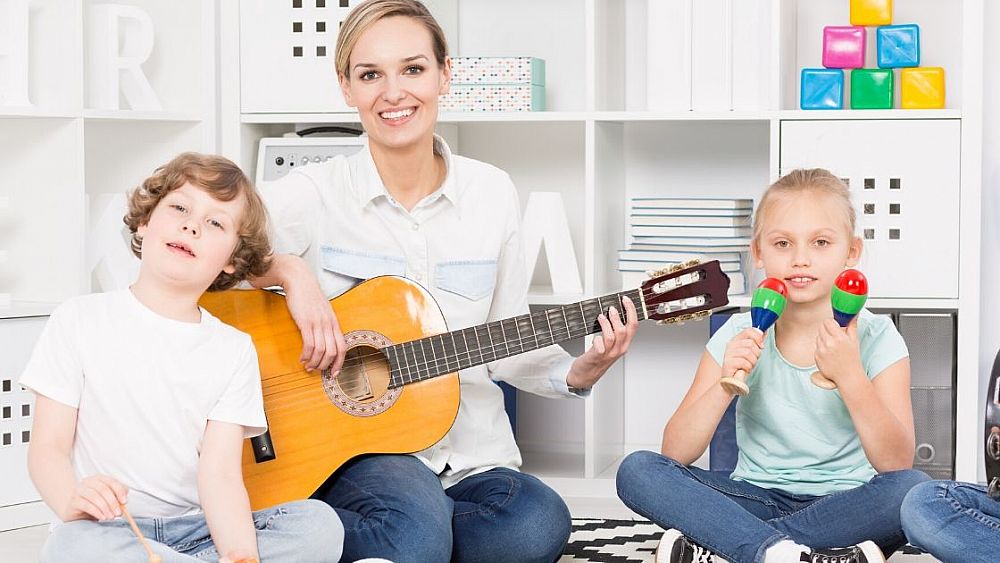Why Do You Need to Use Songs in Your Classroom?

Sitting in a classroom can be such a boring and dull time for children if the teacher is not playful, fun, and creative with the tasks and activities he/she provides. I understand that teaching requires a whole lot of information to be imported into the heads of the students, but I honestly think there are very many paths to the same goal.
This post was written by our TEFL certification graduate Hristina M. Please note that this blog post might not necessarily represent the beliefs or opinions of ITTT.
Personal Experience
In my personal learning experience, I have encountered many strategies and techniques and I have found that I, as well as most other people I have had the chance to observe, learn much faster in a relaxed and playful atmosphere.
A few years ago I studied Spanish through the method of Suggestopedia. This method pays little attention to grammar and structure and focuses more on ‘getting the feel of the melody of a language’. Taking advantage of the benefits of learning L2 as we learned our L1. Naturally, easily, without an effort. During the course, we sang many songs. The ones we liked we sang many times. I never really felt like I was studying per se. However, a few months later when exposed to the language during my travels I was surprised at the high level of understanding I had of the language I was hearing. The vocabulary at my disposal was shocking. I didn't even know I had memorized the words I was using. Even though I did not feel like I truly knew the language, when exposed to these circumstances of having no other way of communicating, the language came out of itself.
Also read: The 7 Biggest Myths About Teaching Abroad Alone as a Woman
Ways to Explain the Materials
Ever since then, I have come to believe that one of the most important factors defining the learning curve of a student is how the material is being introduced. If the teacher finds a way to offer it in an easy-going manner, without too much seriousness and pressure, the students are much more likely to absorb it deeply into their subconscious mind. Later on, when the need arises it is there, ready to come to the surface. Singing, songwriting, dancing, and other more artistic activities are in my opinion the best way to trigger language learning and stimulate the creative development of children in general.
How to integrate
In my teaching practice I plan to use song and dance, as an integral part of many, but not all, of my classes. I also intend to stimulate my students to write their lyrics and record them for me to listen. Many songs easily can put forth a grammar point, reinforce vocabulary, and help with pronunciation difficulties. Thanks to the unmeasurable variety of English songs it would not be too hard to keep things interesting and unpredictable. Learning songs that the kids like is a learning process that easily leaves the classroom and becomes a part of their life, as they will always sing along when their favorite song comes on, making the language theirs much more rapidly.
Do you want to teach English abroad? Take a TEFL course!
Unfortunately, the world puts too much pressure on the upcoming generations to learn and excel, robbing them of their childhood. Kids deserve to play and create, laugh, and dance, to be lite and careless. Life comes around soon enough to take them out of that blissful zone. For what depends on me, learning and playing should never be separate. Children should not be stressed into adulthood. There are better ways.
Apply now & get certified to teach english abroad!
Speak with an ITTT advisor today to put together your personal plan for teaching English abroad!
Send us an email or call us toll-free at 1-800-490-0531 to speak with an ITTT advisor today.
Related Articles:
- The Most Common Problems Students in Russia Face When Learning English
- 4 Striking Advantages for Non-Native English Teachers in the TEFL Classroom
- 5 Great Places to Teach English Abroad Without a Degree
- What’s Stopping You from Teaching English Abroad?
- The Truth About TEFL for Non-Native English Speaking Teachers
- Top 10 Places to Take Your TEFL Course in Winter



